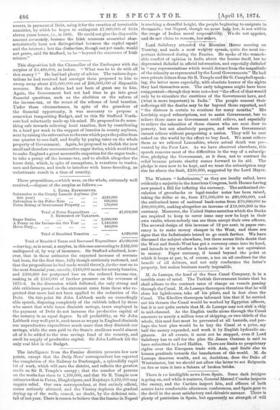These propositions, —which were, on the whole, extremely well received,—dispose
of the surplus as follows :-
1. EXTRA EXPENDITURE. Subvention to the Comity Lunatic Asylums (for
this year) ... £240,000
Subvention to the Police Rate ... ... 600,000
Extra Rating of Government Property ... 170,000
Total of Extra Expenditure ...
£1,010,000
2. REMISSION OP TAXATION.
Sugar Duties ... 2,000,000
A Penny on the Income-tax this Year ... ... 1,540,000
Horse Duty... ... ... 480,000
Total of Remitted Taxation ...
4,020,000 Total of Remitted Taxes and Increased Expenditure £5,030,000 —leaving, as is usual, a surplus, in this case amountingto £462,000 undisposed of, by way of insurance. Sir Stafford admitted, how- ever, that in these estimates the expected increase of revenue had been, for the first time, fully though cautiously reckoned, and that the propositions he had made would throw'a further cost on to the next financial year, namely, 1240,000 more for county lunatics, and £300,000 for postponed loss on the reduced Income-tax, making in all £540,000 of further pressure on the revenues of 1875-6. in the discussion which followed, the only strong and able criticisms passed on the statement came from those who re- gretted that more had not been applied to the reduction of the Debt. On this point Sir John Lubbock made an exceedingly able speech, disposing completely of the rubbish talked by those who assert that while taxes diminish savings, taxes employed in the payment of Debt do not increase the productive capital of the country in an equal degree. In all probability, as Sir John Lubbock very well put it, such taxes as we pay in England diminish our unproductive expenditure much more than they diminish our savings, while the sum paid to the State's creditors would almost all of it be added to the true savings fund of the country, and swell its supply of productive capital. Sir John Lubbock hit the only real blot in the Budget.


































 Previous page
Previous page